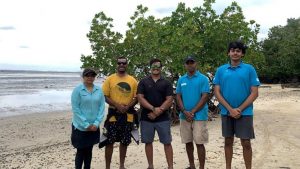

Associate Dean Learning and Teaching Dr Shalini Singh and Mr Etuate Serevi, with MACBLUE project members Mr Shyam Lodhia, Mr Semi Balecala, and Mr Trinesh Chaudhar.
NADROGA, Fiji – The MACBLUE project, in collaboration with the Fiji National University’s (FNU) College of Agriculture, Fisheries and Forestry (CAFF), has initiated a dedicated seagrass monitoring programme in Komave Village, Vusu District, Nadroga Province. This initiative follows the successful completion of the seagrass restoration project in Nataleira Village, Dawasamu.
The initiative, which commenced on 27 March 2025 and will continue through the end of October, is part of a broader effort to safeguard Fiji’s coastal ecosystems. On Friday, 21 August 2025, representatives from CAFF, together with the GIZ MACBLUE project team, carried out monitoring fieldwork in Komave Village.
FNU was represented by Associate Dean Learning and Teaching Dr Shalini Singh and Mr Etuate Serevi, who worked alongside MACBLUE project members Mr Shyam Lodhia, Mr Semi Balecala, and Mr Trinesh Chaudhar.
Using the standardized Seagrass-Watch methodology, the team collected high-quality and consistent data on seagrass health, coverage, and distribution. These efforts are vital for informing conservation strategies, strengthening community involvement, and building long-term resilience for coastal ecosystems.
The Seagrass-Watch methodology is a globally recognised, community-based approach to assessing the health and distribution of seagrass meadows. Designed to be simple enough for local communities and volunteers to use, yet scientifically robust to guide management decisions, it enables accurate monitoring that contributes to both local and global knowledge. Once data is collected, it can be formally submitted to the Seagrass-Watch global database, adding to long-term ecological assessments and international conservation planning.
CAFF Dean, Dr Kaliova Ravuiwasa, said the project demonstrates the strength of collaboration between the university, international partners, and local communities.
“Seagrass ecosystems are essential in supporting fisheries, protecting coastlines from erosion, and storing carbon. This monitoring initiative ensures that our students, researchers, and communities have access to reliable data that will strengthen Fiji’s environmental conservation efforts,” Dr Ravuiwasa said.
The monitoring programme highlights FNU’s continued commitment to applied research, environmental sustainability, and partnerships that empower communities to actively protect and manage their marine resources.
END